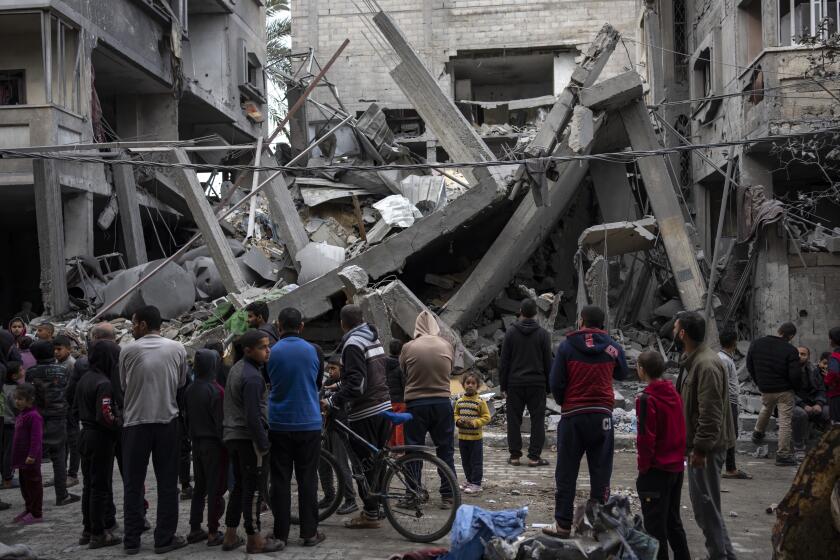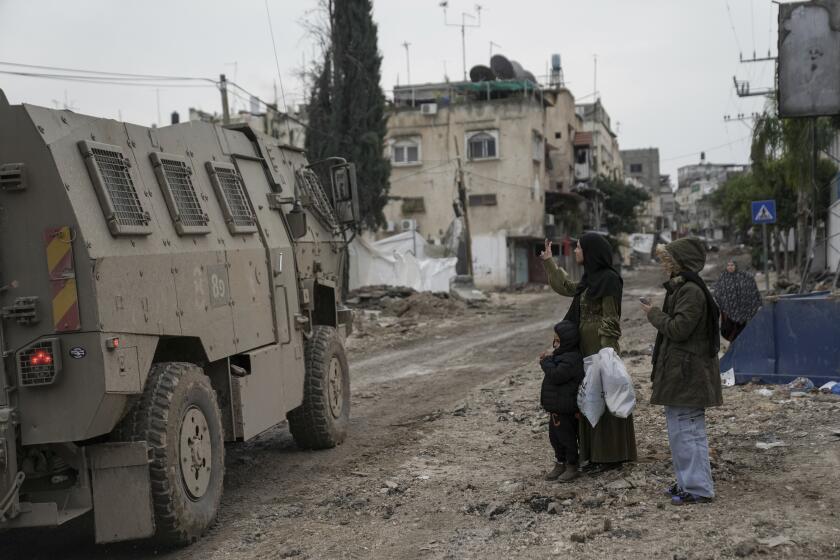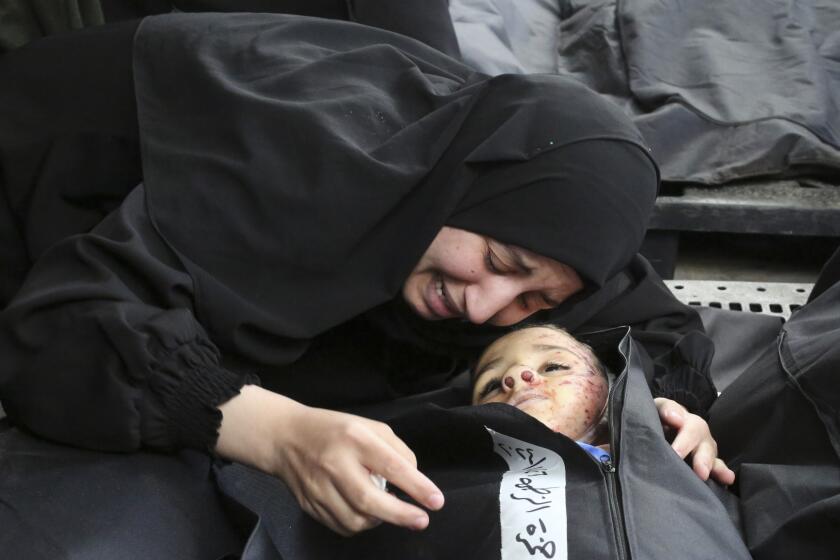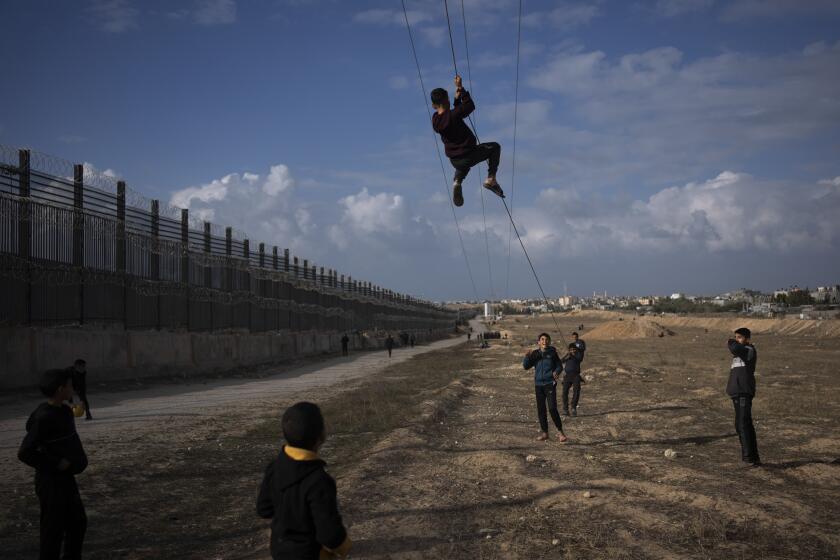Israel and Hamas dig in as international pressure builds for a cease-fire in Gaza
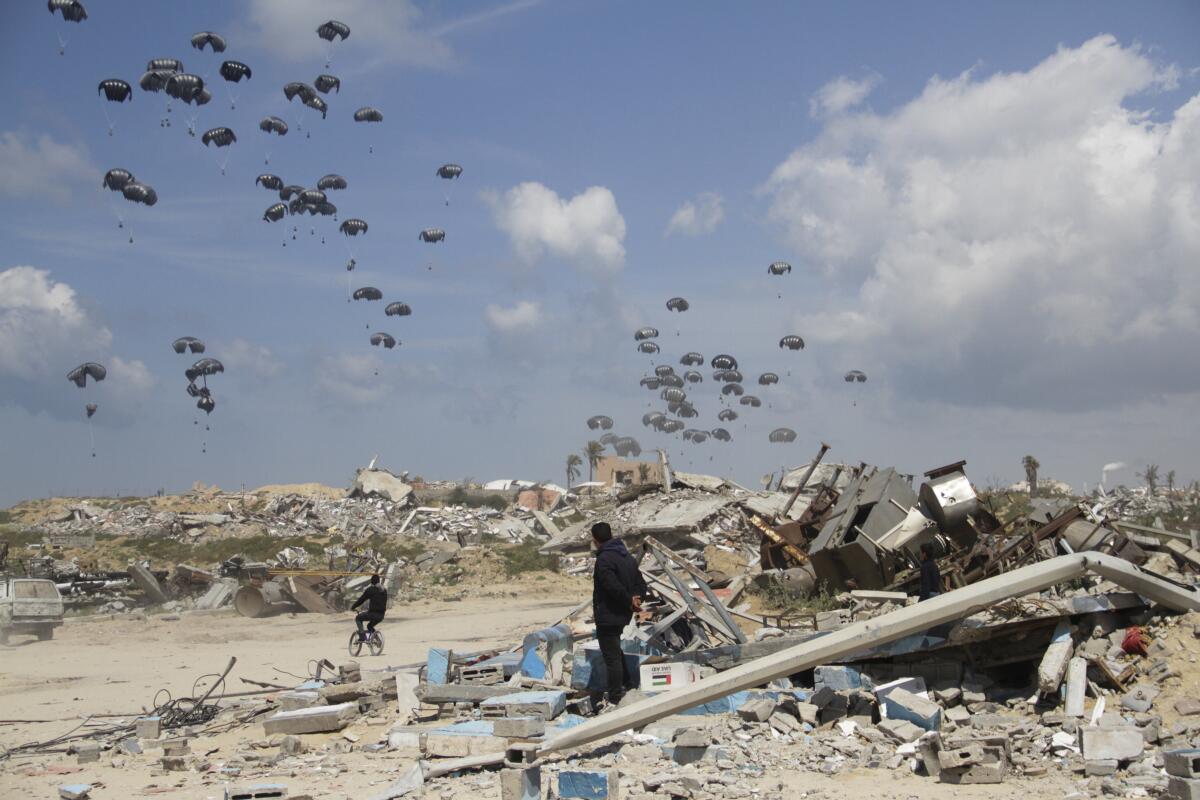
- Share via
JERUSALEM — Prime Minister Benjamin Netanyahu on Tuesday vowed to press ahead with Israel’s offensive in Gaza and blasted a U.N. Security Council resolution calling for a pause in the fighting, saying it had emboldened Hamas to reject a separate proposal for a cease-fire and hostage release.
As the war grinds through a sixth month, each side has publicly insisted that its idea of victory is within reach and has rejected international efforts to stem the bloodshed.
Netanyahu has said Israel can achieve its aims of dismantling Hamas and securing the return of scores of hostages if it expands its ground offensive to the southern city of Rafah, where more than half of Gaza’s population has sought refuge, many in crowded tent camps.
Hamas has said it will hold onto hostages until Israel agrees to a more permanent cease-fire, withdraws its forces from Gaza and releases hundreds of Palestinian prisoners, including top militants. It said late Monday that it had rejected a recent proposal that fell short of those demands — which, if fulfilled, would allow it to claim an extremely costly victory.
The U.N. Security Council has demanded a cease-fire in Gaza during the Islamic holy month of Ramadan. The resolution passed 14-0 after the U.S. abstained.
Netanyahu said in a statement that the announcement “proved clearly that Hamas is not interested in continuing negotiations toward a deal and served as unfortunate testimony to the damage of the Security Council decision.
“Israel will not surrender to Hamas’ delusional demands and will continue to act to achieve all the goals of the war: releasing all the hostages, destroying Hamas’ military and governing capabilities and ensuring that Gaza will never again be a threat to Israel,” he added.
The war has killed more than 32,000 Palestinians, according to Gaza’s Health Ministry, which does not distinguish between civilians and combatants in its tally but says women and children make up about two-thirds of those killed. The fighting has left much of the Gaza Strip in ruins, displaced most residents and driven a third of the population of 2.3 million to the brink of famine.
An Israeli strike late Monday on a residential building in Rafah where three displaced families were sheltering killed at least 16 people, including nine children and four women, according to hospital records and relatives. An Associated Press reporter saw the bodies arrive at a hospital.
Opinions on how to handle the war against Hamas in the Gaza Strip are emerging among senior Israeli officials as the fighting drags on in the enclave.
On Monday, the Security Council managed to pass a resolution calling for a cease-fire as the United States abstained instead of vetoing the measure — angering Israel, in a major escalation of tensions between the two allies. The resolution calls for the release of all hostages held in Gaza but does not condition the cease-fire on it.
Israeli Foreign Minister Israel Katz told Army Radio on Tuesday that the resolution had emboldened Hamas by signaling that international pressure would end the war without the militant group having to make concessions.
“The message delivered to Hamas yesterday … is that you don’t have to hurry,” Katz said.
The war began Oct. 7, when Hamas-led militants stormed across the border and attacked communities in southern Israel, killing some 1,200 people, mostly civilians, and abducting around 250. Hamas is believed to still be holding about 100 hostages and the remains of 35; most of the rest were freed in November in exchange for the release of Palestinian prisoners.
President Biden has signaled that a cease-fire in Gaza could be at hand, but Israel and Hamas indicate no deal is imminent.
The U.S., Qatar and Egypt have spent weeks trying to negotiate another cease-fire and hostage release, but those efforts appeared to have stalled.
Hamas said late Monday that Israel has not responded to its core demands of a “comprehensive cease-fire, an [Israeli] withdrawal from the Strip, the return of displaced people and a real prisoner exchange.”
Majed al-Ansari, a spokesperson for the Foreign Ministry of Qatar, which is hosting the talks, told reporters that the negotiations were ongoing, without providing details.
Hamas has previously proposed a phased process in which it would release all remaining hostages in exchange for a full Israeli withdrawal from Gaza, the opening of its borders for aid and reconstruction and the release of hundreds of Palestinian prisoners, including top militants serving life sentences.
Israel and Egypt are engaged in an increasingly public spat over a narrow strip of land between Egypt and Gaza.
Netanyahu has vowed to resume Israel’s offensive after any hostage release and keep fighting until Hamas is destroyed, saying it’s the only way to prevent a repeat of the Oct. 7 attack. But he has provided few details about what would follow such a victory and has largely rejected a postwar vision outlined by the United States.
That approach has brought him into increasingly open conflict with President Biden’s administration, which has expressed mounting concern over civilian casualties while supplying Israel with crucial military aid and backing its aim of destroying Hamas. The U.S. vetoed previous U.N. resolutions calling for a cease-fire.
The White House has urged Israel not to undertake a major ground operation in Rafah, warning that it could cause a humanitarian catastrophe. The administration was set to brief visiting Israeli officials on an alternative approach, but Netanyahu called off their visit in response to the U.S. abstention at the United Nations.
Israeli Defense Minister Yoav Gallant is in Washington on a separate trip, however, and was to meet Tuesday with U.S. Defense Secretary Lloyd J. Austin III.
Goldenberg, Jeffery and Shurafa write for the Associated Press. Shurafa reported from Rafah.
More to Read
Sign up for Essential California
The most important California stories and recommendations in your inbox every morning.
You may occasionally receive promotional content from the Los Angeles Times.
